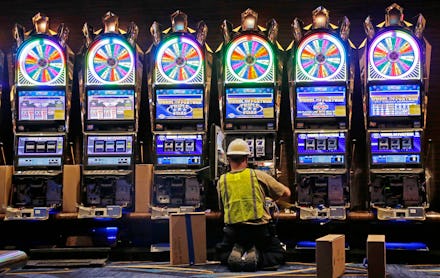New York Casinos Are Coming, So Here's How the State Can Make Them Work

On this year's Election Day, citizens of New York state approved Proposal 1 with 57% of the vote, allowing seven casinos to be built within the state. Prior to its passage, only Native American tribes and horse-race tracks could open gaming facilities, besides the state, which sells lottery tickets. Governor Andrew Cuomo and the state legislature plan to place four of the seven new casinos in upstate New York and make the other three emerge in New York City after seven years. The stated goals of the measure are to bolster employment and to provide funds for education and tax relief locally. This is good news for New York, and if the state and local governments handle the roll-out of the change well, both of the goals will be reached.
Strange bedfellows converged to advocate for and against Prop 1. Labor unions such as the AFL-CIO and the United Federation of Teachers joined force with the Business Roundtable to support the amendment's passage. Anti-gambling organizations and socially conservative groups found themselves in agreement with the New York Times editorial board in calling for the proposal's rejection. Opponents cited concerns that casinos would bring more addiction and crime, while not delivering any economic gains. The New York Times editorial was especially scathing: "Gambling is a regressive tax that takes its highest toll on those who can least afford it." While those who hesitate to allow casinos have good intentions, facts and experiences show the likely success of the new casino policy will allay their worries.
The story of Bethlehem, Pennsylvania is an inspiring example. When de-industrialization claimed the steel plant central to the city as a casualty, the community revived itself by welcoming a casino built on the plant's former site. Soon businesses of downtown Bethlehem grew. "It's brought new life to the area," a resident there said. A less stellar outcome in New York itself ensued when a casino was started by the Seneca tribe in the city of Salamanca. Employment did increase, but local businesses felt no effect.
In neither of the two cities did crime or addiction skyrocket to plague communities. In other words, when the four upstate casinos are built, the results will be good at best, and the status quo at worst. This sounds like a safe bet to me. Furthermore, in a 1997 study by Rephann, Dalton and Isserman, the researchers compared counties with new casinos with similar ones without, and concluded the former fared significantly better in economic indicators. The number of people receiving public assistance was lower in counties with casinos, refuting the contention by the New York Times that casinos hurt the poor. A 2003 study with similar methodology focused on crime rates indicates casinos do not necessarily increase crime. And while I dislike the specific quota of seven casinos that Prop. 1 imposes, allowing market forces to dictate whether they're built in the first place is a step in the right direction.
There are two caveats to the various advantages posed by the additional casinos. First, local governments may be lazy enough to rely solely on the casino as the source of revenue and growth, neglecting economic diversification. Smaller municipalities are particularly vulnerable. It is unwise to put all eggs in one basket. When the car industry in Detroit tanked, the city fell with it, and the New York Times editorial rightly points out when gaming revenues in Atlantic City, N.J. dipped, loss of jobs and worsening poverty values followed. But this is not a reason to ban casinos. Ups and downs can happen to any industry, whether it is automobile, oil, or gaming, and it is up to local leaders to diversify their communities' economic base. Secondly, the Rephann study warns that many localities may not reap the full benefits in casinos as the job opportunities could primarily go to individuals brought in from far away, and tax revenue may not be fully captured by the local governments. Thus, local officials must figure out the best ways to ensure that taxes are collected in full, and that locals get first priority when new jobs at these casinos are created.
When a casino expansion referendum was on the ballot last year in Rhode Island, I voted in favor. My parents and I visited a casino in the state afterwards and it was my first time in one. While we did not spend money there, I was quite intrigued by the establishment's comedy club. Casinos have things to offer even to those who would never gamble. The voters of New York made the right decision, and now it is up to the state and local governments to strategize, realize the seven casinos' full potential, and allow the people of New York state to reap the benefits.